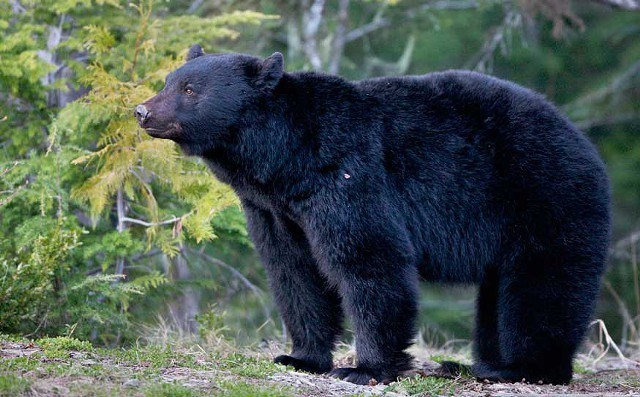Two more bears were destroyed in Whistler over a two-day period last week, raising questions for the Conservation Officer Service (COS) over whether Whistlerites are becoming too tolerant of bears’ presence in populated areas.
A sow with a long history of conflict was captured and killed Thursday, July 31 after she managed to break through the window of a residence on Alta Lake Road. A woman and her son were in the townhouse at the time and locked themselves in a bedroom while the animal rummaged through the kitchen. The RCMP responded and hazed the bear away, only to see it return and attempt to gain entry through the same window.
The sow and her cub were eventually captured, and the cub was taken to the Critter Care facility in Langley, where he will remain until he’s old enough to be released.
The bear had been a problem for authorities for over a month, said conservation officer Simon Gravel, and had previously entered a building through an open door in Bayshores, had accessed and become trapped in a shed shortly after that and had also gained entry to several vehicles.
“We dealt with her on many occasions and we knew she was slowly becoming more of a public safety concern because she was trying to enter buildings,” Gravel said, adding that the kind of behaviour the sow demonstrated by forcing her way though a closed window is never tolerated by the COS.
“According to our bear management matrix, this bear was definitely at the threshold where she had to be destroyed for public safety reasons.”
The second bear death occurred Saturday, Aug. 2 when a small male bear was reported in the village, a no-go zone for conservation officers due to the high potential for conflict with humans. Gravel spent several hours hazing the tagged bear out of the busy area to no avail.
“He went away a few times but was persistent and came back,” he said, adding that Saturday was not the first time this bear was seen in the village. “He was very difficult to chase and was not afraid of me at all. He walked through the village, through an area where people were eating on a terrace, looking for food.”
Gravel even observed the bear smelling a pedestrian’s hand at one point.
“He was showing signs of habituation that was very concerning behaviour for us because people were approaching him within two or three feet and taking pictures,” Gravel said. “I got information from bikers that they observed people throwing food at him (near the Whistler Mountain Bike Park) as well, which kind of explains what I observed in the village this morning when he was smelling the hand of a human.”
A third high-conflict bear was also dealt with last week after displaying problem behaviour, although it was not killed but captured and relocated to an alpine region on Friday, Aug. 1.
So far this summer a total of seven bears* have been destroyed in Whistler and Gravel is concerned with what he sees as a rise in high-conflict behaviour from the resort’s ursine population.
“The number of bears entering buildings this year has been higher than usual. That’s definitely a concern,” he said.
A major issue for the COS in a community like Whistler where residents are so tolerant of wildlife, Gravel said, is that in many cases bear sightings go unreported, leaving conservation officers with fewer options when dealing with an animal that shows signs of habituation to humans.
“One thing we can change in Whistler to save more bears is to not tolerate them as much because we often never receive a phone call that a bear is in an area somewhere,” he explained. “I understand that, I have a strong respect for wildlife as well … but maybe we have to question ourselves as a community; should we tolerate these bears so close to our homes? We pretty much tolerate them to a point that eventually they get into conflicts and aren’t afraid to push the boundaries that lead to their destruction.
“The best thing that can happen to a bear is a negative experience with humans, not a positive one. The bears we’ve been dealing with this week are extremely habituated to the point they don’t see us as a threat at all but as a food source.”
Immediately report any wildlife sightings to the Conservation Officer Service at 1-877-952-7277.
An earlier version of this story noted that nine bears have been killed in Whistler this summer. That total reflects the number of bears killed across the entirety of the Sea to Sky, not Whistler. We apologize for the error.




